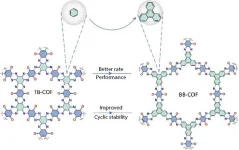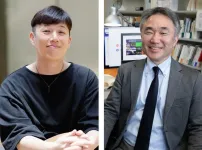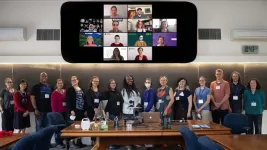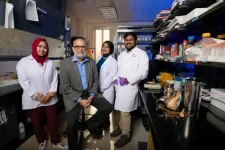(Press-News.org) Despite public perception, the Antarctic ozone hole has been remarkably massive and long-lived over the past four years, University of Otago researchers believe chlorofluorocarbons (CFCs) aren’t the only things to blame.
In a study, just published in Nature Communications, the group analysed the monthly and daily ozone changes, at different altitudes and latitudes within the Antarctic ozone hole, from 2004 to 2022.
Lead author Hannah Kessenich, PhD candidate in the Department of Physics, says they found there is much less ozone in the centre of the ozone hole compared to 19 years ago.
“This means that the hole is not only larger in area, but also deeper throughout most of spring.
“We made connections between this drop in ozone and changes in the air that is arriving into the polar vortex above Antarctica. This reveals the recent, large ozone holes may not be caused just by CFCs,” she says.
While the Montreal Protocol on Substances that Deplete the Ozone Layer, which has been in place since 1987, regulates the production and consumption of man-made chemicals known to deplete the ozone, the researchers believe other complex factors are also contributing to the ozone hole.
“Most major communications about the ozone layer over the last few years have given the public the impression that the ‘ozone issue’ has been solved.
“While the Montreal Protocol has vastly improved our situation with CFCs destroying ozone, the hole has been amongst the largest on record over the past three years, and in two of the five years prior to that.
“Our analysis ended with data from 2022, but as of today the 2023 ozone hole has already surpassed the size of the three years prior – late last month it was over 26 million km2, nearly twice the area of Antarctica.”
Ms Kessenich believes understanding ozone variability is important because of the major role it plays in the Southern Hemisphere’s climate.
“We all know about the recent wildfires and cyclones in Australia and New Zealand and the Antarctic ozone hole is part of this picture.
“While separate from the impact of greenhouse gases on climate, the ozone hole interacts with the delicate balance in the atmosphere. Because ozone usually absorbs UV light, a hole in the ozone layer can not only cause extreme UV levels on the surface of Antarctica, but it can also drastically impact where heat is stored in the atmosphere.
“Downstream effects include changes to the Southern Hemisphere’s wind patterns and surface climate, which can impact us locally.”
She is quick to allay fears about extreme UV rays, though.
“New Zealanders need not worry about applying extra sunscreen this year as the Antarctic ozone hole is generally not open above New Zealand – it is mostly located directly over Antarctica and the South Pole.”
END
Study highlights need to keep an eye on the ozone hole
2023-11-21
ELSE PRESS RELEASES FROM THIS DATE:
Scientists take a step forward in understanding how to tackle chronic infections in cystic fibrosis patients
2023-11-21
Scientists have engineered a living material resembling human phlegm, which will help them to better understand how a certain kind of infection develops on the lungs of patients with cystic fibrosis.
The study, published in Matter, was led by Dr Yuanhao Wu and is a collaboration between Professor Alvaro Mata in the School of Pharmacy and Department of Chemical Engineering and Professor Miguel Cámara from the National Biofilms Innovation Centre in the School of Life Sciences at the University of Nottingham.
Biofilms are strong living 3D materials that play ...
BU study finds long-term acute care hospital closures associated with changes in hospital care practices
2023-11-21
EMBARGOED by JAMA Network Open until 11 am, ET, Nov. 21, 2023
Contact: Gina DiGravio, 617-358-7838, ginad@bu.edu
BU Study Finds Long-term Acute Care Hospital Closures Associated with Changes in Hospital Care Practices
(Boston)—Long-term acute care hospitals (LTCHs) are common sites of post-acute care for patients recovering from severe respiratory failure requiring long-term mechanical ventilation. Because of longer lengths of stay compared to regular, short-stay hospitals, the Centers for Medicare and Medicaid (CMS) reimburses LTCHs at higher rates. However, since 2005, ...
How do we learn? Neuroscientists pinpoint how memories are likely to be stored in the brain
2023-11-21
What is the mechanism that allows our brains to incorporate new information about the world, and form memories? New work by a team of neuroscientists led by Dr Tomás Ryan from Trinity College Dublin shows that learning occurs through the continuous formation of new connectivity patterns between specific engram cells in different regions of the brain.
Whether on purpose, incidentally, or simply by accident, we are constantly learning and so our brains are constantly changing. When we navigate the world, interact with each other, or consume media content, our brain is grasping ...
Bone growth drug may reduce sudden infant death syndrome in children with common form of dwarfism
2023-11-21
A drug that boosts bone growth in children with the most common form of dwarfism, may also reduce their chances of sudden infant death syndrome, sleep apnoea and needing surgery, according to a new study.
The international research trial, led by Murdoch Children’s Research Institute (MCRI) and published in The Lancet Child & Adolescent Health, has showed for the first time that vosoritide treatment increases height, facial volume and the size of the foramen magnum, the hole at the base of the skull that connects the brain with the spinal cord, in children under five with achondroplasia.
MCRI is the largest vosoritide ...
Density matters for better battery material performance, researchers find
2023-11-21
Zinc — cheap, abundant, environmentally friendly — may be the answer to better batteries, but there’s a major problem: Aqueous zinc ion batteries (AZIBs) cannot match lithium-ion batteries in terms of power output. To test what electrode material composition might be able to bring AZIBs up to par, a research team based in China developed two organic frameworks with the same constituents but arranged in different ways.
When put to the test, the framework with appropriate density of active sites — where the zinc ions gain electrons to recharge the ...
AHRI and BGI Genomics sign MoU to enhance public health outcomes in Ethiopia
2023-11-21
On October 13, 2023, in Addis Ababa, Armauer Hansen Research Institute (AHRI) and BGI Genomics signed a Memorandum of Understanding to enhance the Institute's genomics and precision medicine capabilities.
The Institute got its name from the Norwegian physician, Gerhard Henrik Armauer Hansen, who first described the leprosy bacillus (Mycobacterium leprae) and joined the Ethiopian Ministry of Health in 2004. Located in Addis Ababa, it serves as a biomedical hub for the region.
BGI Genomics provides ...
Unraveling autism spectrum disorder mechanisms through rigid-autonomous phase sequences
2023-11-21
This study delves into the behavioral complexities of autism spectrum disorder (ASD) by introducing the rigid-autonomous phase sequence (RAPS) formation concept. RAPS are may be responsible for the cognitive, sensory-motor, and memory-related challenges faced by individuals with ASD. By uniting these insights under a single theoretical framework, this research paves the way for innovative treatments, promising a brighter future for those with ASD.
Autism spectrum disorder (ASD) is a complex neuropsychiatric condition, marked ...
CSHL rolls out STEM ‘Bicycle Principles’
2023-11-21
Success in science, technology, engineering, and mathematics (STEM) demands keeping up with the latest tools and techniques. The AI boom, for example, has made coding and data management skills integral. But going back to school isn’t an option for most scientists. Short training programs like webinars and boot camps have become a popular alternative among busy STEM professionals. However, these formats can have significant shortcomings. There’s often no guarantee attendees will leave with the skills needed to advance their careers. And they can be exclusionary, preventing learners of all abilities and circumstances from benefiting equally.
“We’ve ...
Coffee grounds may hold key to preventing neurodegenerative diseases
2023-11-21
EL PASO, Texas (Nov. 21, 2023) – Neurodegenerative disorders, including Alzheimer’s, Parkinson’s and Huntington’s, affect millions of people in the United States, and the cost of caring for people who live with these conditions adds up to hundreds of billions of dollars each year.
Now, researchers from The University of Texas at El Paso may potentially have found a solution in used coffee grounds — a material that is discarded from homes and businesses around the world every day.
A team led by Jyotish Kumar, a doctoral student in the Department of Chemistry and Biochemistry, and overseen by Mahesh ...
Gender stereotypes embedded in natural language
2023-11-21
Gender stereotypes harm people of both genders—and society more broadly—by steering and sometimes limiting people to behaviors, roles, and activities linked with their gender. Widely shared stereotypes include the assumption that men are more central to professional life while women are more central to domestic life. Other stereotypes link men with math and science and women with arts and liberal arts. Perhaps surprisingly, research has shown that countries with higher economic development, individualism, and gender-equality tend to also have more pronounced gender differences in several domains, ...






